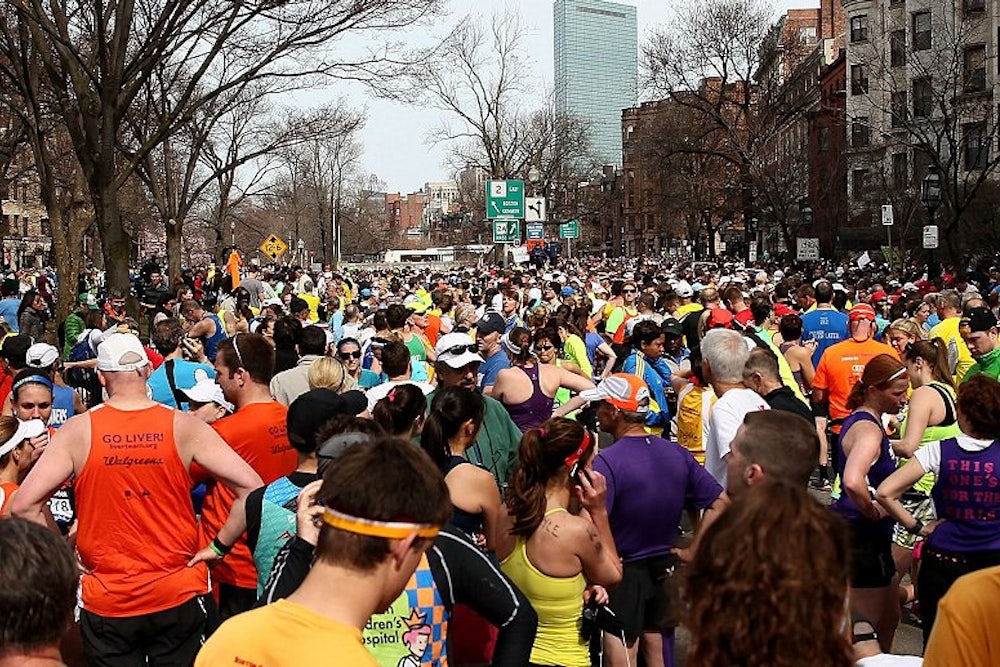Among the many responses Leon Wieseltier received to his recent Diarist about the terrorism in Boston was this extraordinarily thoughtful piece by a victim of the bombings.
I was roughly ten feet from the first bomb. In the now iconic pictures amateur photographer Ben Thorndike took, you can see me standing toward the left-hand side of the frame, my hands covering my ears. In front of me is my friend Diane, lying on the ground, seemingly lifeless. To my right is Laura, curved over, facing away from the explosion, trying to shield herself from the kind of damage that took the lives and limbs and sense of normalcy from too many others.
The three of us, fortunately—or, perhaps more accurately, miraculously—were all relatively fine. Diane needed stitches in her temple and hand; a large piece of glass fell on her from the second floor. Laura is on crutches, due to a fairly deep laceration in her foot from a piece of shrapnel or glass. They both have hearing damage. (I was the luckiest of the three of us.)
This weekend, we had the good fortune to share our story with over one hundred people, during a monthly event we host called The Loft Sessions. We had planned to bring former Law & Order star Linus Roache up from New York City to give a talk. Instead, he decided to introduce us.
Step-by-step, we recounted the events, from the joy of seeing our good friend Kenzo race toward the finish line, to the disorienting shock and horror of being at the epicenter of the first terrorist attack on U.S. soil since 9/11, to the slow, confusing, and emotionally complex process of psychological and physiological recovery.
It was powerful to share our story with so many close friends and new acquaintances. Afterward, we played music. We cried. Danced. Laughed. Embraced.
But perhaps more powerful than the story, than the tears, than the physical proximity of friends and loved ones and sympathetic strangers, was the recognition that we are all deeply, profoundly, and inextricably connected, indelibly and inarguably interdependent. It was a moment to appreciate how, as human beings, we are cut from one fabric, a fabric that has different weaves and patterns and chromatic shades but, at its core, no difference.
In the wake of an inexplicable tragedy, and, subsequently, a beautiful and justifiably joyous celebration of justice, many of us want to return to “normal”. We want our routines back. We want to be texting and emailing about topics other than death and terror and trauma, speaking about things like baseball and the Bruins and blind dates, arguing over whether we should go out to eat wood-fire-oven pizza in the North End or just order delivery from home and watch a comedy or drama or foreign flick. We deserve all of that.
But we should also hesitate to put ourselves back together entirely. As horrific and despicable and gut-wrenchingly terrible as an event like what so many of us experienced was and still is, it also gives us—and I say this lightly—the opportunity to recognize more deeply the unity that underlies difference, the sheer beauty of human relatedness and resilience.
If “normal” means a life without fear of survival, then, by all means, yes, let’s return to it. But if it implies a society still plagued by indifference, isolation, alienation, and narcissism, then let us turn this moment into a stepping stone, one upon which we open ourselves ever-more widely to one another—and, in the reverberating halo of the blindingly bright light our city and people demonstrated last week, rethink how we live, relate, work, and govern.
We will not defeat terrorism through superior technology and intelligence and policies alone. Those things are, of course, entirely necessary and important. But if we are to truly defeat the principle of terror, that intention that exists in the darkest parts of the human psyche to inflict indiscriminate harm on the innocent and unsuspecting, we must find a way to, as the great Jesuit priest and paleontologist Pierre Teilhard de Chardin wrote, turn “suffering into spiritual energy.”
Let us return to normalcy in routine. But let us also bear witness to the suffering we have all seen and shared by evolving to a place in our selves and in society that is anything but normal.
Sam Rosen is Vice President of Audience Engagement at Digitas and co-founder of The Loft Sessions. Follow him at @samrosen.
